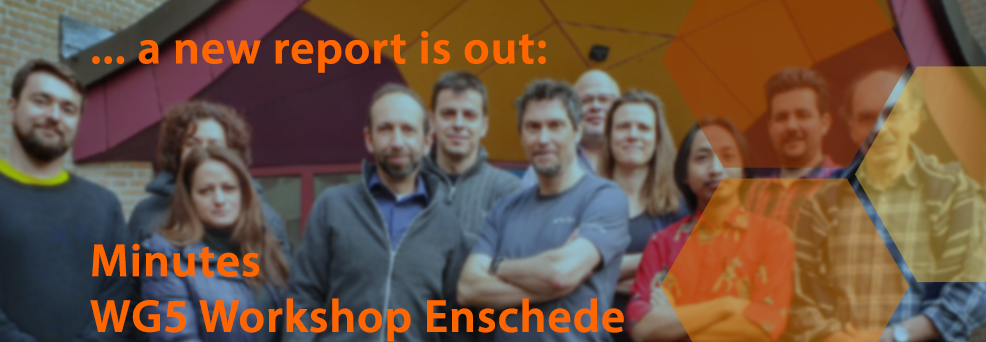Workshop Report WG5: On citizen-science ontology, standards and data
Coverpicture_WG5Enschede_2019.png

Type: Working Group Meeting
Location: Enschede, The Netherlands
Date: 21-22 March, 2019
Duration: 2 day
Excerpt from the report:
Background
The main aim of COST Action CA15212 “ Citizen Science to promote creativity, scientific literacy, and innovation throughout Europe ” (2016-2020) [ https://cs-eu.net/ ] is to bundle capacities across Europe to investigate and extend the impact of the scientific, educational, policy, and civic outcomes of citizen science with the stakeholders from all sectors concerned (e.g., policy makers, social innovators, citizens, cultural organizations, researchers, charities and NGOs), to gauge the potential of citizen science as enabler of social innovation and socio-ecological transition.
One goal of the COST Action is to help create an ontology (including a vocabulary) for describing citizen-science projects, observations and analyses, building upon prior research and existing standards, which any organization can model their database structure upon. This goal is also linked to the larger objectives of the international Data and Metadata Working Group of the Citizen Science Association (CSA) and the European Citizen Science Association (ECSA).
The WG aims to better define PPSR-Core and publish it as a standard for citizen science, reusing existing standards as much as possible. As a result of our joint discussion in Geneva in 2018, we (the members of COST Action 15212’s WG 5 and of the CSA International Data and Metadata Working Group) agreed to change the name of this model to PPSR - Common Conceptual Model (CCM) - hereafter also the “model” - and to re-name its three main schemas: Project Metadata Model (PMM), Dataset Metadata Model (DMM) and Observation Data Model (ODM). Partners/collaborators in this effort are, among others: DataONE, CSIOR, ECSA, ACSA, CSA, and COST Action 15212’s WG 5. Standards to be leverages are, among others: EML, FGDC, OGC related. The Project Metadata Model (PMM) will facilitate the interoperability between platforms, such as Scistarter, citsci,org, and the Wilson Center catalogue. It describes the project itself, giving the organization and project-level context for the data. We aim to retrofit existing functionality and carry out internal mappings to the locked-down published standard. The Dataset Metadata Model (DMM) allows for information to be consistently presented for fitness and for reusability of data at the dataset level. It describes the contextual background for the collection of data records, e.g., methods. The Observation Data Model (ODM) describes the actual data.
With respect to data quality we consider the following facets: accuracy, precision, completeness, consistency, validity, timeliness. The aim is to represent the “fitness for use” of citizen-science data, and to understand what is needed to improve data credibility.
Objectives
The general objectives of Working group 5 “ Improve data standardization and interoperability “ are:
- to explore ways for integrating data and knowledge related to citizen-science initiatives and suggest mechanisms for standardization, interoperability, and quality control;
- to improve the technical foundations to foster the impact of citizen science globally.
WG5’s specific objective for the third period (1.5.2018-30.4.2019) is to contribute to develop an ontology of citizen-science projects (including a vocabulary of concepts and metadata) to support data sharing among citizen-science projects. WG5 will coordinate with activities on data and service interoperability carried out in Europe, Australia and the USA (e.g., the CSA’s international Data and Metadata Working Group [ http://citizenscience.org/association/about/working-groups/ ]), and will take into account existing standards, namely Open Geospatial Consortium (OGC)
standards (via the OGC Domain Working Group on Citizen Science), ISO/TC 211, W3C standards (semantic sensor network/Linked Data), and existing GEO/GEOSS semantic interoperability. WG5 will investigate the best format to publish the ontology.
By convening COST Action’s members with expertise in data and metadata representation, WG5 aims to:
- refine core requirements of the ontology based on existing use cases and the discussion happening in the corresponding Basecamp project [ https://basecamp.com/2071195/projects/13342949 ] (access restricted to WG5 members);
- continue to identify core ontology fields and associated metadata by drawing on previous research and existing vocabularies, in particular the Report from CSA 2017 and Future Outlook by the international Citizen Science Association Data & Metadata Working Group: [ https://www.wilsoncenter.org/article/citizen-science-association-datamet... ];
- develop a plan for the uptake of the ontology by the citizen-science community at large.